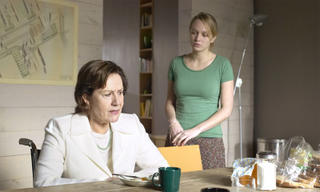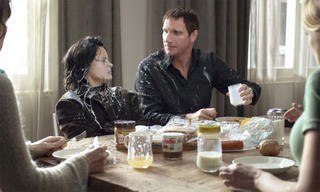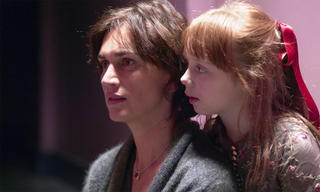10/07/2005
Life is for living
Anna and the papers of her story
 Yesterday I saw the movie "Leef!" (Live!) from Maria Goos. It was heavy because everything - the sadness and suffering, the ethical claims, the symbols, and the sweetness - all of this was over the top. The reality of life was concentrated and packed in an ironic covering of sentimental clichés, in the same way as this was done in "As it is in heaven". Leef!, however, was at times more a story about "As it is in hell", although the main character, Anna, was called an angel by the "knuffel allochtoon" ("teddy bear immigrant") in the film.
Yesterday I saw the movie "Leef!" (Live!) from Maria Goos. It was heavy because everything - the sadness and suffering, the ethical claims, the symbols, and the sweetness - all of this was over the top. The reality of life was concentrated and packed in an ironic covering of sentimental clichés, in the same way as this was done in "As it is in heaven". Leef!, however, was at times more a story about "As it is in hell", although the main character, Anna, was called an angel by the "knuffel allochtoon" ("teddy bear immigrant") in the film.
 Forgiveness was one of the central themes in the film. The most awful person in the film is Anna's mother, she doesn't apologize for the wrong she has done to her daughter and so she cannot be forgiven. She reminded me of my grandmother from my mothers side, a frozen loveless dominant egocentric person with a sick mind.
Forgiveness was one of the central themes in the film. The most awful person in the film is Anna's mother, she doesn't apologize for the wrong she has done to her daughter and so she cannot be forgiven. She reminded me of my grandmother from my mothers side, a frozen loveless dominant egocentric person with a sick mind.
What I wrote about in my post below, forms the red line in the film, about how the traumas from the past influence the present and the future, and what you can do to come to peace with your past and with the people who hurt you or whom you have hurt. Anna wanted to be a writer since she was six, she wrote something every day. Her mother said that she was good for nothing and that she would never become a good writer. Her step father insulted her and raped her. Her mother made her believe that Anna, as a little child, did something terrible, but something she didn't do, in fact . But Anna's feelings of guilt for this made her later life very heavy. It's incredible how indifferent her mother remains throughout the whole film. She admits that she's a terrible bitch - something my grandmother would never have admitted - and she says she had a life full of shit, which she uses as an excuse for her faults, and for which she hopes that people will pity her, which doesn't happen however (which isn't surprising).
Daddy with his difficult daughter
 Gregor the knuffelallochtoon / Balkan refugee asks Anna's mother how she could ever do that to her child, and if she doesn't feel guilty at all. He keeps asking questions, he wants to know the truth and he wants to awaken the conscience of Anna's mother. Then Anna decides that she will write everything down, so that Gregor can read what happened and so that he doesn't have to ask so many questions anymore. To write down what happened is a process to remake the past so that she could find peace with it. The whole film is full of this process at different levels, as I wrote it in my last post: people talk to each other, the one who has hurt the other listens to the others story, he shows that he understand it and he apologizes from the bottom of his heart for what he has done. And then they can make a new start together. Anna's man feels sorry for his adultry and admits it, says sorry and stops it. One of their daughters even gets a new heart to symbolize the new start.
Gregor the knuffelallochtoon / Balkan refugee asks Anna's mother how she could ever do that to her child, and if she doesn't feel guilty at all. He keeps asking questions, he wants to know the truth and he wants to awaken the conscience of Anna's mother. Then Anna decides that she will write everything down, so that Gregor can read what happened and so that he doesn't have to ask so many questions anymore. To write down what happened is a process to remake the past so that she could find peace with it. The whole film is full of this process at different levels, as I wrote it in my last post: people talk to each other, the one who has hurt the other listens to the others story, he shows that he understand it and he apologizes from the bottom of his heart for what he has done. And then they can make a new start together. Anna's man feels sorry for his adultry and admits it, says sorry and stops it. One of their daughters even gets a new heart to symbolize the new start.
This is a typical Levinas film, because it is full of "works of justice", of Anna and Gregor helping an old lost lady on the street to find her way back home, of Anna saving the life of an unknown child while her own child is falling from her bike, of her daughter who protects her father so that the adultry isn't discovered, and who tries her best to stop her parents from fighting with each other.
Present Anna with the little Anna
 What I found very beautiful in the film, is how Anna listened to her heart, how she each time tried to find the way back to her core, to her fundamental inner nature, to find peace, rest and strenght there. The little Anna, the girl when she was 6 years old, has always stayed with her, and promised that she would never leave. The little girl helps her with her writing. In the film the girl really stands in front of her, they talk together. This is a very beautiful vision I think, that we should all keep the little child that we were in the past with us, that we keep that child forever in our hearts.
What I found very beautiful in the film, is how Anna listened to her heart, how she each time tried to find the way back to her core, to her fundamental inner nature, to find peace, rest and strenght there. The little Anna, the girl when she was 6 years old, has always stayed with her, and promised that she would never leave. The little girl helps her with her writing. In the film the girl really stands in front of her, they talk together. This is a very beautiful vision I think, that we should all keep the little child that we were in the past with us, that we keep that child forever in our hearts.
Maybe that could be what Levinas calls the other in ourselves. Levinas each time emphasizes the important role that the other plays in my life, I can only be free and responsible when I am liberated by the other, I can't do that myself. But I think that this doesn't mean that what I have inside of me wouldn't matter, that it would only be an imprisoned egoism. A human being is like a candle, a candle can't lighten itself, the other is needed to enlighten it. But once my light is burning, it is my own passion which is burning, my passion is still being fed by the interaction with passion from the other, but what burns in my candle is my own fire of desire. The end of the film is very beautiful: Anna puts out her ear rings and puts off her shoes. She leaves the busy party that was organised to celebrate her 20 years marriage with her husband. She just walks out of the room - and the knuffelallochtoon says "Leef!" to her and waves her goodbye - then she walks in the street, with her socks and her cold party dress. Then the little Anna comes to her and they walk hand in hand...
And now I will end with a U2 quote:
Baby slow down
The end is not as fun as the start
Please stay a child somewhere in your heart
 Yesterday I saw the movie "Leef!" (Live!) from Maria Goos. It was heavy because everything - the sadness and suffering, the ethical claims, the symbols, and the sweetness - all of this was over the top. The reality of life was concentrated and packed in an ironic covering of sentimental clichés, in the same way as this was done in "As it is in heaven". Leef!, however, was at times more a story about "As it is in hell", although the main character, Anna, was called an angel by the "knuffel allochtoon" ("teddy bear immigrant") in the film.
Yesterday I saw the movie "Leef!" (Live!) from Maria Goos. It was heavy because everything - the sadness and suffering, the ethical claims, the symbols, and the sweetness - all of this was over the top. The reality of life was concentrated and packed in an ironic covering of sentimental clichés, in the same way as this was done in "As it is in heaven". Leef!, however, was at times more a story about "As it is in hell", although the main character, Anna, was called an angel by the "knuffel allochtoon" ("teddy bear immigrant") in the film.Anna's mother and the daughter with a new heart
 Forgiveness was one of the central themes in the film. The most awful person in the film is Anna's mother, she doesn't apologize for the wrong she has done to her daughter and so she cannot be forgiven. She reminded me of my grandmother from my mothers side, a frozen loveless dominant egocentric person with a sick mind.
Forgiveness was one of the central themes in the film. The most awful person in the film is Anna's mother, she doesn't apologize for the wrong she has done to her daughter and so she cannot be forgiven. She reminded me of my grandmother from my mothers side, a frozen loveless dominant egocentric person with a sick mind.Daddy with his difficult daughter
 Gregor the knuffelallochtoon / Balkan refugee asks Anna's mother how she could ever do that to her child, and if she doesn't feel guilty at all. He keeps asking questions, he wants to know the truth and he wants to awaken the conscience of Anna's mother. Then Anna decides that she will write everything down, so that Gregor can read what happened and so that he doesn't have to ask so many questions anymore. To write down what happened is a process to remake the past so that she could find peace with it. The whole film is full of this process at different levels, as I wrote it in my last post: people talk to each other, the one who has hurt the other listens to the others story, he shows that he understand it and he apologizes from the bottom of his heart for what he has done. And then they can make a new start together. Anna's man feels sorry for his adultry and admits it, says sorry and stops it. One of their daughters even gets a new heart to symbolize the new start.
Gregor the knuffelallochtoon / Balkan refugee asks Anna's mother how she could ever do that to her child, and if she doesn't feel guilty at all. He keeps asking questions, he wants to know the truth and he wants to awaken the conscience of Anna's mother. Then Anna decides that she will write everything down, so that Gregor can read what happened and so that he doesn't have to ask so many questions anymore. To write down what happened is a process to remake the past so that she could find peace with it. The whole film is full of this process at different levels, as I wrote it in my last post: people talk to each other, the one who has hurt the other listens to the others story, he shows that he understand it and he apologizes from the bottom of his heart for what he has done. And then they can make a new start together. Anna's man feels sorry for his adultry and admits it, says sorry and stops it. One of their daughters even gets a new heart to symbolize the new start.This is a typical Levinas film, because it is full of "works of justice", of Anna and Gregor helping an old lost lady on the street to find her way back home, of Anna saving the life of an unknown child while her own child is falling from her bike, of her daughter who protects her father so that the adultry isn't discovered, and who tries her best to stop her parents from fighting with each other.
Present Anna with the little Anna
 What I found very beautiful in the film, is how Anna listened to her heart, how she each time tried to find the way back to her core, to her fundamental inner nature, to find peace, rest and strenght there. The little Anna, the girl when she was 6 years old, has always stayed with her, and promised that she would never leave. The little girl helps her with her writing. In the film the girl really stands in front of her, they talk together. This is a very beautiful vision I think, that we should all keep the little child that we were in the past with us, that we keep that child forever in our hearts.
What I found very beautiful in the film, is how Anna listened to her heart, how she each time tried to find the way back to her core, to her fundamental inner nature, to find peace, rest and strenght there. The little Anna, the girl when she was 6 years old, has always stayed with her, and promised that she would never leave. The little girl helps her with her writing. In the film the girl really stands in front of her, they talk together. This is a very beautiful vision I think, that we should all keep the little child that we were in the past with us, that we keep that child forever in our hearts.Maybe that could be what Levinas calls the other in ourselves. Levinas each time emphasizes the important role that the other plays in my life, I can only be free and responsible when I am liberated by the other, I can't do that myself. But I think that this doesn't mean that what I have inside of me wouldn't matter, that it would only be an imprisoned egoism. A human being is like a candle, a candle can't lighten itself, the other is needed to enlighten it. But once my light is burning, it is my own passion which is burning, my passion is still being fed by the interaction with passion from the other, but what burns in my candle is my own fire of desire. The end of the film is very beautiful: Anna puts out her ear rings and puts off her shoes. She leaves the busy party that was organised to celebrate her 20 years marriage with her husband. She just walks out of the room - and the knuffelallochtoon says "Leef!" to her and waves her goodbye - then she walks in the street, with her socks and her cold party dress. Then the little Anna comes to her and they walk hand in hand...
And now I will end with a U2 quote:
Baby slow down
The end is not as fun as the start
Please stay a child somewhere in your heart